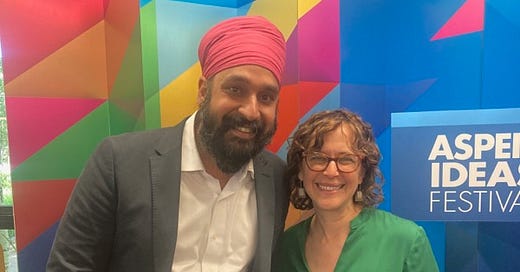Have you ever heard someone tell you that they will: “pray for you”? I heard it a lot growing up in Texas.
For many people, it’s a heartfelt expression, a sign of care and love. But for me, growing up Sikh in a predominantly Christian community, that phrase kind of caught me off guard.
Though the intention behind those words might be beautiful, how do you respond when someone offers a prayer in a tradition that’s different from your own?
In the past, hearing someone tell me that they’d pray for me made me feel a little awkward, like I was being offered something that wasn’t fully mine to accept.
But perhaps it’s less important to get stuck on the exact wording and the differing religious traditions we each belong to and maybe it’s more important to take in and accept the care behind these offerings.
It’s in this spirit that spoke with Rabbi Shira Stutman. She’s a friend and a podcast host (check out Chutzpod!), and she has a brand new book out called The Jewish Way to a Good Life (which you can order here). In this episode of Wisdom & Practice, Shira and I spoke about a number of things, including the concept of “radical welcoming” and how we can bring it into our everyday lives and communities. She shares her unique perspective on being ready to pivot and adapt in order to embrace people from all walks of life along with the importance of creating space for self-exploration—something that can be both personal and communal.
Shira makes it clear that when we allow ourselves and others the freedom to explore, we pave the way for deeper connection and understanding. And how meaningful actions—whether through service, prayer, or simply showing up for one another—can lead us to a greater sense of happiness and fulfillment.
Read an excerpt below, and listen to the full conversation on Wisdom & Practice here.
Simran Jeet Singh: In your new book, you focus a lot on happiness as a value, and I’ve heard you question, really meaningfully, whether happiness is a kind of intrinsic, instrumental, individual, or collective value. Can you share more about what insights and reflections arise when you're thinking through these questions on happiness?
Rabbi Stutman: So, I feel like in Judaism, happiness—which I’ll define as just an internal feeling of joy—is a feeling of contentment, of being grounded, of feeling at home. You can feel it in your body when you're happy.
In Judaism, happiness is both an intrinsic and an instrumental value. As an intrinsic value, happiness is lovely and good in and of itself. But—perhaps a thousand times more so—it’s an instrumental value, meaning it’s a kind of value that’s supposed to help us reach something greater. There's a deeper good associated with it. So, happiness is wonderful. But in the Jewish imagination, happiness is best manifested, for instance, at a wedding. The idea of dancing with the bride and groom, with the celebrants—it’s actually a Jewish law. It’s one of the things we are commanded to do in this world. That’s happiness in the service of something greater: community, celebration, and supporting others on their special day.
I also think that Jewish tradition—and contemporary scientific research, actually—both hold that meaning-making acts can lead us to happiness. Whether it’s through prayer for those of us who pray, or through doing good in the world—giving charity, which in Hebrew we call tzedakah, or volunteering—these kinds of meaningful acts are what actually lead us to happiness. The idea that just buying more things will make you happy—it just doesn’t work in Jewish thought. That idea doesn’t jive with the tradition. The idea that giving more things away can make you happy—that does. And I assume this is true in many other faith traditions as well.
I think about happiness a lot because, in America—we were talking earlier about how the culture you're in shapes the religious tradition—in America, we think and talk a lot about happiness. American capitalist culture, in order to succeed, needs to convince us that more things will make us happier. But Judaism stands in contrast to that. It’s not necessarily things that make us happy—it’s community, being with and supporting others, especially those in need.
And I’ll just say one last thing. Judaism has about 15 different words for what we often translate as “happy.” There’s one word for the happiness that makes you want to yell out loud, another for a quieter kind of happiness, another for happiness specifically experienced at a communal event. So it’s not that Judaism doesn’t want people to be happy. It’s just that happiness is not the ultimate goal. It doesn’t end with happiness.
Click here to listen to the full interview with Rabbi Shira Stutman on Wisdom & Practice. And click here to order her new book!





